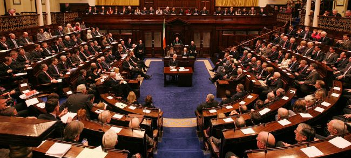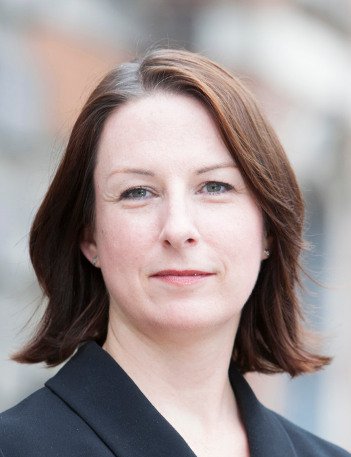Gender Quotas in Politics – Yea or Nay?
In 2012, former Environment Minister Phil Hogan introduced legislation stating that all political parties running in the next general election must ensure at least 30% of their candidates are female. Any party failing to comply with this gender quota would face having their government funding cut in half. The legislation was introduced to develop female political representation in Ireland. As it stands, women only account for 16% of seats in Dáil Éireann.
 2015 has seen a resurgence of the debate surrounding the introduction of gender quotas in Irish politics. The announcement of a spring election led to a need for parties to finalise their candidates – ensuring at least 30% of them were female, lest they be financially penalised. While many are supportive of this legislation that will ultimately lead to more women than ever being represented in the Dáil, others have expressed concern regarding the ‘fairness’ of gender quotas – citing it as undemocratic, and a gesture of ‘tokenism.’[pullquote]The legislation was introduced to develop female political representation in Ireland. As it stands, women only account for 16% of seats in Dáil Éireann.[/pullquote]
2015 has seen a resurgence of the debate surrounding the introduction of gender quotas in Irish politics. The announcement of a spring election led to a need for parties to finalise their candidates – ensuring at least 30% of them were female, lest they be financially penalised. While many are supportive of this legislation that will ultimately lead to more women than ever being represented in the Dáil, others have expressed concern regarding the ‘fairness’ of gender quotas – citing it as undemocratic, and a gesture of ‘tokenism.’[pullquote]The legislation was introduced to develop female political representation in Ireland. As it stands, women only account for 16% of seats in Dáil Éireann.[/pullquote]
One of the predominant arguments against gender quotas is that they allow unqualified candidates to run for positions purely based on gender, not experience. Earlier this year, Derek J Byrne expressed this exact concern in the Irish Times, where he called gender quotas a “male solution to a male problem.” Byrne questioned whether any woman “with a sense of her own self-worth” would truly be content taking a job from a male candidate who is more qualified.
While Byrne insists that he does support the further integration of women in politics, his comments do appear to suggest that most women who decide to run for electoral positions are simply incapable of doing the job. Women for Election’s Suzanne Collins recently dispelled this myth, stating that her organisation’s research has proven that over 90% of female candidates from larger parties have either been elected at local or national level, or at least run before.
These female candidates are qualified, competent and capable, and more importantly are proven campaigners and vote winners (…) A total of 1242 TDs have been elected since 1918 but only 95 have been women. Change is needed and gender quotas are the only internationally proven method of rebalancing the gender disparity in representative politics.

However, Collins told me that quotas are only part of Women for Election’s solution. While the threat of financial penalties has ensured that parties are more willing to find female candidates, their actions following the finalisation of tickets are just as important as their actions before. “It is essential that women receive training, mentoring and support to maximise their opportunities and votes,” she said. “Getting women on the ticket is half the battle; getting them elected is vital.”
Collins also attributes the severe lack of female representation in Irish politics to women’s anxieties about sustaining adequate support from their parties, and parties’ historical inefficiency in pursuing female candidates until now.
Where some large parties once struggled to find women to run for elections, they are now securing more and more female candidates with ease. Even Fianna Fáil – who last month made headlines when a meeting in Longford turned chaotic as a female electorate was nominated without a vote – have just scraped past the 30% mark. However, it’s not just those in Longford who are critical of the legislation. Last week, it was reported that Brian Mohan, Fianna Fáil’s Dublin Central representative, sought legal action against gender quotas.
When I asked Mohan about his concerns regarding the law and the next general election, he told me that legislative interference is not the best way to promote a female voice within politics.
This interference should only be done by the public at the ballot box. The fact that the Government is financially penalising parties for not reaching the quota is a serious issue (…) The government (is) influencing our democratic choice to select which person we want to vote for.
Mohan also mentioned that rather than forcing parties to select women for their tickets, the government should address the barriers currently in operation to impede equal gender representation in politics. He suggested that changing Dáil sitting times would allow for easier access to childcare, and ensure that Leaders’ Questions occur at a more suitable time.

“That being said,” he continued, “in this day and age, it’s not always just women doing the childcare. This (change) would also allow male TDs and senators to be more involved in their children’s upbringing.” Mohan also made reference to Ógra Fianna Fáil’s recently elected officer board, which achieved a majority of female representatives without a quota.
While Mohan has been directly affected by the legislation himself, his concerns still echo the criticisms of many others who oppose gender quotas. Last week, former Minister for Public Enterprise Mary O’Rourke stated that Dáil Éireann needs more women, but the means of which they are going about achieving this goal are “disgraceful and undemocratic.” A select few individuals who responded positively to O’Rourke’s comments took this disapproval of the matter even further, suggesting that they simply would not be voting for any woman in the next general election, as they could not be sure whether she had achieved her place on merit, or ‘because of her gender.’
Reactions such as these serve the interest of very few, as both those opposing and favouring gender quotas do seem to agree on one thing – that the Dáil needs more women. Last month, Women for Election’s co-founder Niamh Gallagher proposed that we apply the same level of scrutiny to male candidates too. “… We must hold all candidates – male and female – to the same standard,” she said. “We all deserve the best, most capable candidates and if more women on the ticket has raised the bar, then that is just another positive effect of this gender quota.”
Images via oireachtas.ie
